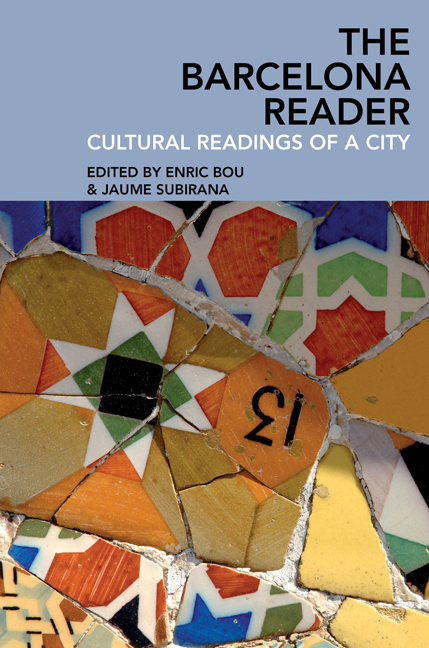Book contents
- Frontmatter
- Contents
- List of illustrations
- Notes on contributors
- Introduction: Barcelona: Cultural readings of a city
- I City, history, and territory
- II City and society
- 6 Barcelona and modernity
- 7 Football and identities in Catalonia
- 8 The family and the city: Power and the creation of cultural imagery
- 9 Memory and the city in Barcelona's cemeteries
- III Art, architecture, and the city
- IV The Olympics and the city
- V Literature, cinema, and the city
8 - The family and the city: Power and the creation of cultural imagery
from II - City and society
- Frontmatter
- Contents
- List of illustrations
- Notes on contributors
- Introduction: Barcelona: Cultural readings of a city
- I City, history, and territory
- II City and society
- 6 Barcelona and modernity
- 7 Football and identities in Catalonia
- 8 The family and the city: Power and the creation of cultural imagery
- 9 Memory and the city in Barcelona's cemeteries
- III Art, architecture, and the city
- IV The Olympics and the city
- V Literature, cinema, and the city
Summary
Beyond its value as an economic and social institution, the Catalan family has also been the basis for cultural imagery. As a metaphor for Catalan society the family became the cornerstone of cultural legitimization and domination by the upper class. As Bourdieu has noted, ‘The dominant factions, whose power is based on economic and political capital, seek to impose the legitimacy of their domination whether through their own symbolic production or through the intermediary of conservative ideologists’ (80). In other work I have examined the cultural presentation of the family in terms of political and economic strategies that positioned the Catalan polity between local class conflicts and state politics (McDonogh). Here the family will be analysed with regard to specifically urbanistic themes, including the control, and even the construction, of modern Barcelona.
The family was a key symbol in the political strategies of the Catalan bourgeoisie of the late nineteenth and early twentieth centuries, through which they sought to establish and unify a national movement. It was both an emotive image and an ambiguous one. In contrasting Catalonia and the rest of Spain the Catalan Civil Code was a symbol of unity, of a distinctive socioeconomic heritage, and of the right to political hegemony. At the same time, when challenged by internal conflicts, the elite and its ideologues interpreted the family in terms of hierarchy, authority, and order. It was the complexity of the image that made it uniquely valuable to one elite in its epoch and to a particular embodiment of Catalan nationalism.
Within everyday interaction in the Catalan capital, however, family was evoked as the basis for a new understanding of the changing social order. In this regard it became an element in an elite sociology of classes and rights. To understand this cultural manipulation of the family, it is necessary to analyse more complex representations of urban society and their impact upon urban planning and urban life.
This chapter focuses on two institutions that embodied an elite ‘sociology’ of industrial society: the Cementiri Vell (Old Cemetery) and the Gran Teatre del Liceu (the Barcelona Opera House). Both were built in the nineteenth century under the aegis of the emergent elite. Both have been dynamic constructions whose physical structure and interpretation have been sensitive to shifting power relations.
- Type
- Chapter
- Information
- The Barcelona ReaderCultural Readings of a City, pp. 185 - 208Publisher: Liverpool University PressPrint publication year: 2017



